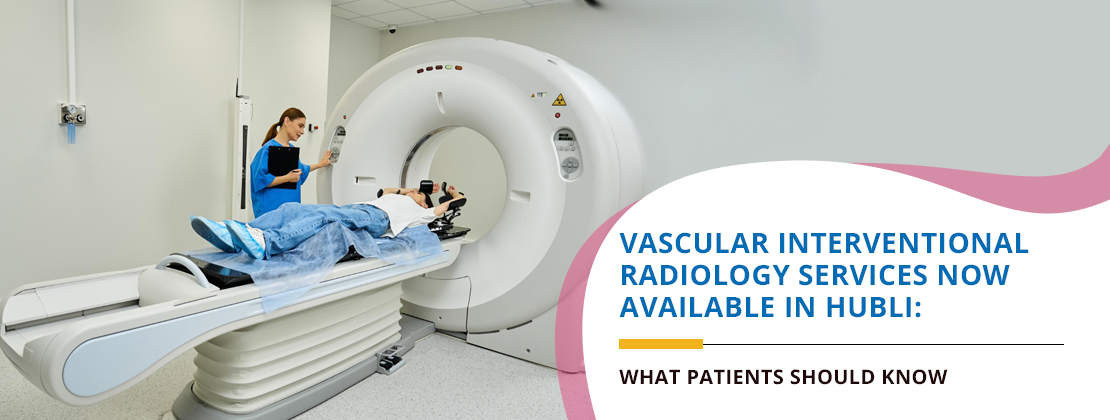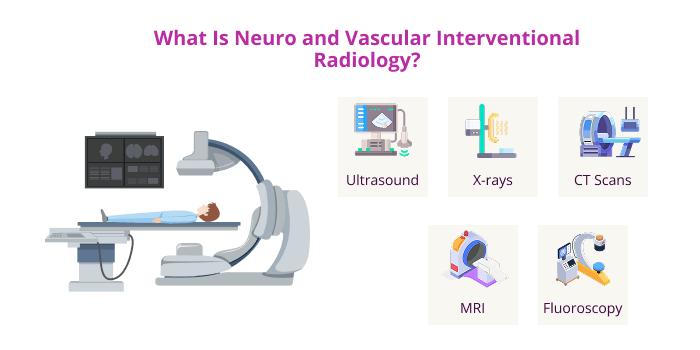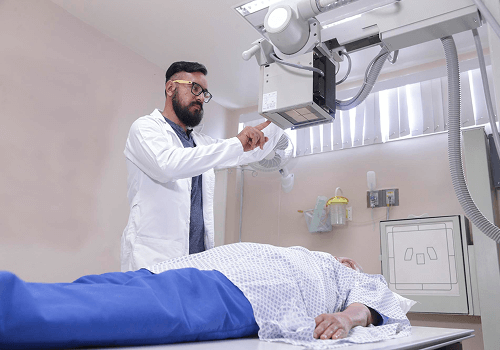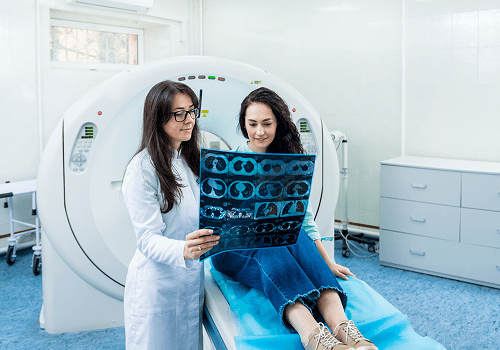
Home / Blog / Vascular Interventional Radiology Services Now Available in Hubli: What Patients Should Know
Healthcare innovation is not only found in big cities anymore. Due to advances in medical technology, smaller cities such as Hubli can provide advanced medical care that used to be available only in metropolitan hospitals.
Neuro and Vascular Interventional Radiology (IR) is a modern field available at HCG Suchirayu Hospital. It involves the use of imaging techniques to carry out minimally invasive procedures through a small pinhole for determining and curing different diseases.
If you’ve been dealing with chronic pain, non-healing medical conditions, neurological issues, or vascular problems and want to avoid surgery, then Neuro and Vascular Interventional Radiology procedures might provide the perfect solution for you. These procedures not only offer precision and safety but also reduce hospital stays and recovery times dramatically.
In this blog post, we will discuss the meaning of Neuro and Vascular Interventional Radiology, its process, the illnesses it helps cure, and the reason why HCG Suchirayu Hospital is at the forefront of this important field in North Karnataka.

Neuro and Vascular Interventional Radiology (IR) is a superspeciality of radiology that involves carrying out operations with little harm or pain to the patient through imaging modalities like:
These imaging tests act as real-time guides to help doctors navigate needles, catheters, and wires through the body to target the exact area of concern without the need for major surgery.
A report from the Society of Interventional Radiology (SIR) has reported that more than 75% of patients go back to their normal routine in less than 3 days, which is much better than what is seen with traditional surgery.
Interventional radiology is not limited to any particular organ or system. It cuts across many fields, such as oncology, gynaecology, urology, neurology, and vascular medicine.
For example, in HCG Suchirayu Hospital, IR procedures are used to manage various vascular, neurological, malignant, and non-malignant conditions.
|
Condition |
IR Procedure |
|
Vascular disease |
Angioplasty, Stenting, Embolisation, Thrombolysis |
|
Strokes |
Mechanical Thrombectomy, Carotid Stenting |
|
Brain Aneurysms |
Endovascular Coiling |
|
Liver tumours, metastases |
Transarterial Chemoembolisation (TACE), Radiofrequency Ablation, Biliary Drainage |
|
Uterine fibroids or Adenomyosis |
Uterine Artery Embolisation (UAE) |
|
Endovenous Laser Therapy (EVLT), Advanced Medical Glue (Venaseal) |
|
|
Deep Vein Thrombosis (DVT) |
Catheter-Directed Thrombolysis, Venous Stenting |
|
Enlarged Prostate (BPH) |
Prostatic Artery Embolisation, Transrectal Biopsy |
|
Kidney and Urinary Tract Obstructions |
Percutaneous Nephrostomy, Kidney Tumour Ablation, DJ Stenting |
|
Spinal Fractures Due to Osteoporosis |
Vertebroplasty/Kyphoplasty |
|
Internal Bleeding |
Angiographic Embolisation |
|
Gastrointestinal Obstructions |
Stent Placements, Drainage |
|
Infertility |
Fallopian Tube Recanalisation, Varicocele |
|
Chronic Pain |
Nerve Blocks or Ablation |
|
Chronic Knee Pain |
Genicular Nerve Block, Genicular Artery Embolisation |
|
Thyroid Swelling/Goitre |
Thyroid Ablation Or Embolisation |
|
Oncology/Cancer-related |
Biopsy, Pain and Palliative Care, Ablations |
These procedures are usually done under local anaesthesia through the pinhole technique without using a scalpel or knife.

” alt=”How the Process Works at HCG Suchirayu Hospital, Hubli” width=”500″ height=”350″ />
HCG Suchirayu Hospital ensures that patients get the best care during interventional radiology procedures through advanced technology, skilled personnel, and compassionate service.
Here’s a quick walkthrough for patients seeking interventional radiology services at HCG Suchirayu:
Patients are either referred by a specialist or can walk in directly for a consultation with the IR team.
State-of-the-art MRI, CT, or ultrasound scans are done to map the exact location and nature of the issue.
Doctors explain the illness, how it can be treated, what could go wrong, and what might happen. Then they make individualised plans for each patient.
Most procedures are done in a special IR suite. These procedures are precise and image-guided and take 30-90 minutes, usually under local anaesthesia.
Patients usually leave for home on the day of surgery or stay overnight for observation. Proper follow-up guarantees full recovery.
For every case, a team of vascular interventional radiologists, anaesthetists, nurses, and diagnostic experts work together to deliver comprehensive care in HCG Suchirayu Hospital.
HCG Suchirayu Hospital is one of the few hospitals that have modern Interventional radiology therapy available in rural areas. This is because:
The IR department collaborates with oncology, nephrology, vascular surgery, gynaecology, and critical care units to provide holistic patient care.
The hospital has modern machines for taking pictures of blood vessels, internal organs, and tissues.
The latest international protocols are followed by interventional radiologists who have been trained by board-certified radiologists.
IR procedures are more affordable than surgeries and are covered under most health insurance policies. HCG Suchirayu Hospital, Hubli, also facilitates cashless hospitalisation.
HCG Suchirayu is filling the healthcare gap in smaller towns by providing city-like services nearby in Gadag, Haveri, Dharwad, and Belgaum.

You should consult an interventional radiologist if:
Even cancer patients who are receiving chemotherapy can benefit from the use of targeted drug delivery with the help of IR-guided procedures that lower general side effects.
Consulting an interventional radiologist at HCG Suchirayu Hospital, Hubli, is simple and patient-friendly.
Don’t forget to bring your medical history, test results, and medicine instructions so that the IR team can correctly assess you.
Interventional radiology is changing how we manage difficult diseases in India. IR is the future of patient-focused healthcare because its procedures are better, faster, and less harmful.
HCG Suchirayu Hospital provides IR services. Therefore, patients from North Karnataka do not need to go to big cities for better treatment. Be it chronic pain, fibroids, tumours, or blocked blood vessels, it is possible to manage these conditions through minimally invasive vascular interventional radiology procedures.
Don’t let fear of surgery stop your healing journey. Explore your options with interventional radiology.
Interventional radiology is an endovascular and minimally invasive medical procedure that treats diseases without open surgery. It uses imaging techniques such as CT scans and X-rays to help in the insertion of small medical instruments into the body. This procedure causes very minimal pain, is safer, and heals faster than surgery.
IR is used to treat brain stroke and aneurysm, vascular blockages, tumours, varicose veins, fibroids, DVT, thyroid swellings, kidney problems, spinal fractures, internal bleeding/vascular leaks, and many other conditions.
Yes. Trained professionals do this using clean and controlled ways. It is safe, and the risk is low, similar to or less than that of a small operation.
Most patients get better within one to three days and can go back to their normal routine.
The majority of the operations are performed under local anaesthesia. Patients may experience slight pain, but they do not undergo intense pain, as happens in a normal surgical process.